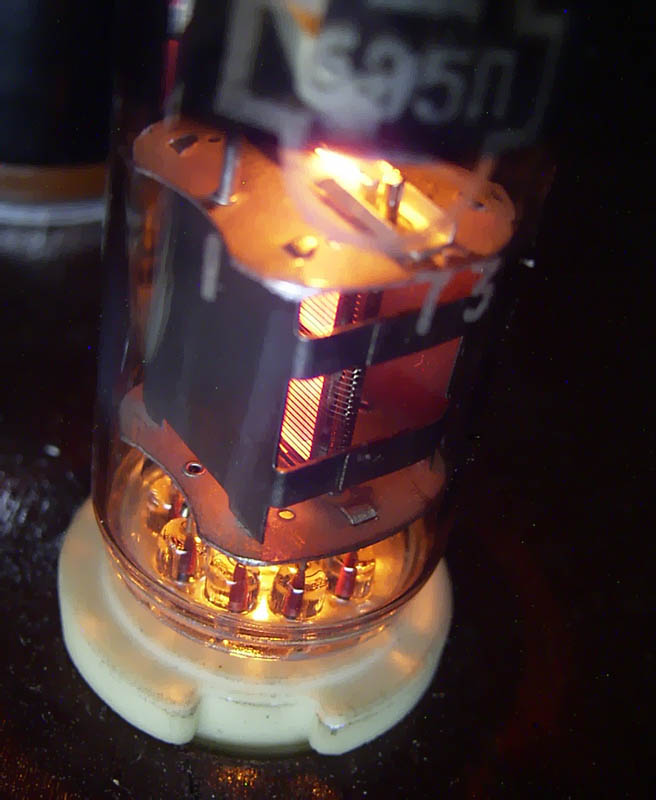|
JJ,
yes, I got Hal-O dampers a few years ago and I do use them but it would require more say then just “I use” them.
I have them for a long time. I initially bought then to use with 7788 tubes that I am employing as an input tubes in my phonocorrector. As you understand at that location a tube with 50.000 mS transconductance needs as much help as it can get. At least it was what I thought intellectually. The 7788 sits at the shock-absorbing socket and with 2 Hal-O dampers. Do the dampers work in there? I do not know as after I picked the tube comforted it in there with all “help” I did not use it without the dampers. I have no microphonics and no parasitic oscillations in my phonocorrector.
Then, when I built the first Milq I figured out that since it uses a very fast 250mHz driver I need to get tube dumpers for it as well. Then the audiophile Moronity stroked me and I got the dumpers for all Super Milq tubes. Why do I call it the “audiophile Moronity”? Certainly I do not imply that the Hal-O dampers are bad solution. However, I did buy all those dumpers and up now I do not know if they have a positive impact to Sound - I still debate it with myself. A right tube (my Milq driver tube might have tendency to be microphonic – but WAY less then 437A-417A - I would say one of twenty 6E5P might be to “live”) does not need any dumpers – it sounds good “as is”. A bad tube could not be also helped by the dumpers. I hardly feel any differences when I use a good tube with or without the tube dumper. Well, I might hear “some” difference (though practically none) but I absolutely defiantly would NOT say that with the dumper the tune sounds “better”.
So, if I use or not use the dumper is does not really matter and if I use them then it is just because I already have them. Reading it, one must understand that in the super Milq the tube sockets are mounts directly on the chassis and the chassis is VERY thick. (~25 pounds barebone, without anything on it). Also there is absolutely nothing inside the Super Milq’s amplifier chassis that might be a source of vibrations – no chokes, no transformers – and when I get the stethoscope and lay it down to the Super Milq’s chassis then it responses with a silence of a gravestone (the cooling fan is another matter). So, perhaps the Super Milq is not the best amp to observe the Hal-O dampers contribution. I do not know how the vibrations of the tube’s glass important as if it is then it would be tube to tube related. BTW, my driver tube according to the specialists has a huge space between the cathodes (I need to post picture) and the tube creates (reportedly) the shape of electronic cloud like no other 9-pin tube. Perhaps it makes the tubes intestines to “talks” with the tube’s glass differently….

The photograph is not mine. The image courtesy to "Real Big Sushi"
From the other side I do feel, not confirmably, that the use of the class dampers minimizes the longetivety of the tubes. I do not know if the dampers were guilty but I have seen in my own practice that the tubes with dampers were turning darker faster then the tubes without dampers.
That brings me to a qestion if I am willing to use the dampers on my 6-chennal new amp. The difference is that on the new amp is that I embraced use of Absorb-GEL device, that I found VERY good and that I feel works better then anything else that I have seen.
http://www.goodsoundclub.com/GetPost.aspx?PostID=3487
When I apply nose to the amp chassis (badly mounted fan) that is well registered via a stethoscope then the noise is not transmitted to the tube then the tube sits on the Absorb-GEL. Still, I did not detect any influence to Sound even then the tube picks the vibration from the fan’s rotation.
What would be more interested if you JJ would point out what to pay attention when I am trying to detect the sonic benefits of the Hal-O dampers? Perhaps I just do not look in the right direction when I listen the results… Rgs, Romy the Cat
"I wish I could score everything for horns." - Richard Wagner. "Our writing equipment takes part in the forming of our thoughts." - Friedrich Nietzsche
|